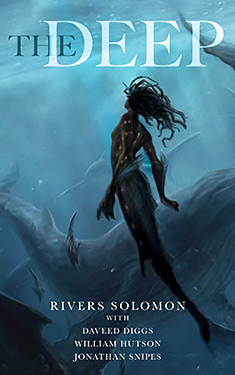Rivers Solomon, Daveed Diggs, et
al.
Completed 8/24/2020, Reviewed 8/24/2020
5 stars
Right on the tail of a book about
women living on an ocean planet, I’ve finished another book about the sea. This time, it’s a mythological tale based on
the horrors of history, our history. During
the slave trade in the U.S., pregnant African women were thrown overboard from
the slave ships if they became sick or just in general too much of a hassle. This mythology is about the infants born as
these women died by drowning. The
infants were transformed into water-breathing, finned beings, the wajinru. Their descendants live together under the sea
and multiplied. The origins were too
painful to remember, so they chose one wajinru to remember everything, the
historian. Once a year the wajinru
gather and the historian shares their remembrances. Then after a few weeks, they all forget and
continue their lives without the pain of the past. This story was inspired by a song by Daveed
Diggs’ rap group clippings. which was inspired by an earlier concept by a
techno group. Diggs’ song was nominated
for a Hugo, as was this novella. It won
the Lambda Literary Award for Sci Fi/Fantasy/Horror in 2020. I loved it.
Yetu is a wajinru historian. She is in constant mental anguish from
remembering all the terrible things from their history, like their origins and
their war with the “two legs”. This is a
different experience from past historians who were energized and emboldened by
holding this knowledge. At the next
remembrance, she shares their history, but before taking it back from the other
wajinru, she swims away, leaving all of them with the burden of history. She swims toward land where she is washed
ashore during a storm into a tidal pool.
She is found by several two legs
and is befriended by one of them. Another,
Oori, is a seafaring woman who fishes, and provides her with food. This contact results in unlikely friendships,
and more.
I was overwhelmed by this
novella. I loved everything about it, the
plot, the characters, the writing, the message.
I was glad it was short; I was able to read it in two sittings. The message is straight-forward. You must reclaim your past, even the darkness,
and learn from it. The plot is also
pretty straight forward, although there are several chapters that jump back to
past historians that took me a bit to process.
But otherwise, it’s not really a complicated book. The trope of someone holding the history of a
people, either for the good of the people or to manipulate them, has been done
before (I can even think of a 70’s made for TV movie that had this trope). But I think it is done really well here.
The characterization is excellent. The majority of the story is third person from
Yetu’s perspective. She was so well
developed, I could feel her anguish carrying the past, and reveled in her
curiosity as she interacted with the two legs.
Other characters were also very vibrant, including Yetu’s mother and
Oori. The latter is a very private,
introverted misanthrope. But she slowly
lets her guard down with Yetu, giving her a transformative but believable experience.
Above all, I found the writing to
be just wondrous. The prose is very
readable without being overbearing. I
savored every sentence. This was one of
those books where I just sank into the rhythm of the language. Even when the time frame jumped into the past
and it took me a while to figure out what was going on, the writing soothed me
into understanding.
I give this book five stars out of
five. It really touched me at a deep
level. I didn’t want to leave the world
that Solomon created. It was beautiful
and painful. Fortunately, at the end,
there’s an afterward by Diggs, the vocalist from clippings. He discusses the evolution of the story from
its techno origins through his group and then into this novella. It provided a nice way to come out from
Solomon’s creation. I think Solomon is a
gifted writer and I can’t wait to read her first book, An Unkindness of Ghosts.

No comments:
Post a Comment